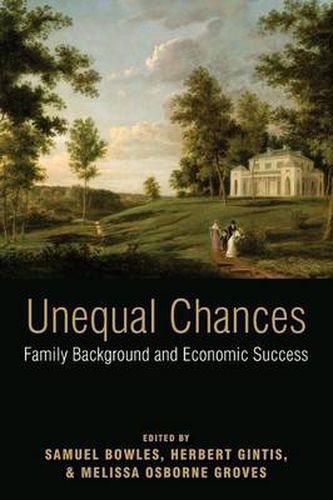Readings Newsletter
Become a Readings Member to make your shopping experience even easier.
Sign in or sign up for free!
You’re not far away from qualifying for FREE standard shipping within Australia
You’ve qualified for FREE standard shipping within Australia
The cart is loading…






Is the United States the land of equal opportunity or is the playing field tilted in favor of those whose parents are wealthy, well educated, and white? If family background is important in getting ahead, why? And if the processes that transmit economic status from parent to child are unfair, could public policy address the problem? Unequal Chances provides new answers to these questions by leading economists, sociologists, biologists, behavioral geneticists, and philosophers. New estimates show that intergenerational inequality in the United States is far greater than was previously thought.Moreover, while the inheritance of wealth and the better schooling typically enjoyed by the children of the well-to-do contribute to this process, these two standard explanations fail to explain the extent of intergenerational status transmission. The genetic inheritance of IQ is even less important. Instead, parent-offspring similarities in personality and behavior may play an important role. Race contributes to the process, and the intergenerational mobility patterns of African Americans and European Americans differ substantially. Following the editors’ introduction are chapters by Greg Duncan, Ariel Kalil, Susan E. Mayer, Robin Tepper, and Monique R. Payne; Bhashkar Mazumder; David J. Harding, Christopher Jencks, Leonard M. Lopoo, and Susan E. Mayer; Anders Bjorklund, Markus Jantti, and Gary Solon; Tom Hertz; John C. Loehlin; Melissa Osborne Groves; Marcus W. Feldman, Shuzhuo Li, Nan Li, Shripad Tuljapurkar, and Xiaoyi Jin; and Adam Swift.
$9.00 standard shipping within Australia
FREE standard shipping within Australia for orders over $100.00
Express & International shipping calculated at checkout
Is the United States the land of equal opportunity or is the playing field tilted in favor of those whose parents are wealthy, well educated, and white? If family background is important in getting ahead, why? And if the processes that transmit economic status from parent to child are unfair, could public policy address the problem? Unequal Chances provides new answers to these questions by leading economists, sociologists, biologists, behavioral geneticists, and philosophers. New estimates show that intergenerational inequality in the United States is far greater than was previously thought.Moreover, while the inheritance of wealth and the better schooling typically enjoyed by the children of the well-to-do contribute to this process, these two standard explanations fail to explain the extent of intergenerational status transmission. The genetic inheritance of IQ is even less important. Instead, parent-offspring similarities in personality and behavior may play an important role. Race contributes to the process, and the intergenerational mobility patterns of African Americans and European Americans differ substantially. Following the editors’ introduction are chapters by Greg Duncan, Ariel Kalil, Susan E. Mayer, Robin Tepper, and Monique R. Payne; Bhashkar Mazumder; David J. Harding, Christopher Jencks, Leonard M. Lopoo, and Susan E. Mayer; Anders Bjorklund, Markus Jantti, and Gary Solon; Tom Hertz; John C. Loehlin; Melissa Osborne Groves; Marcus W. Feldman, Shuzhuo Li, Nan Li, Shripad Tuljapurkar, and Xiaoyi Jin; and Adam Swift.